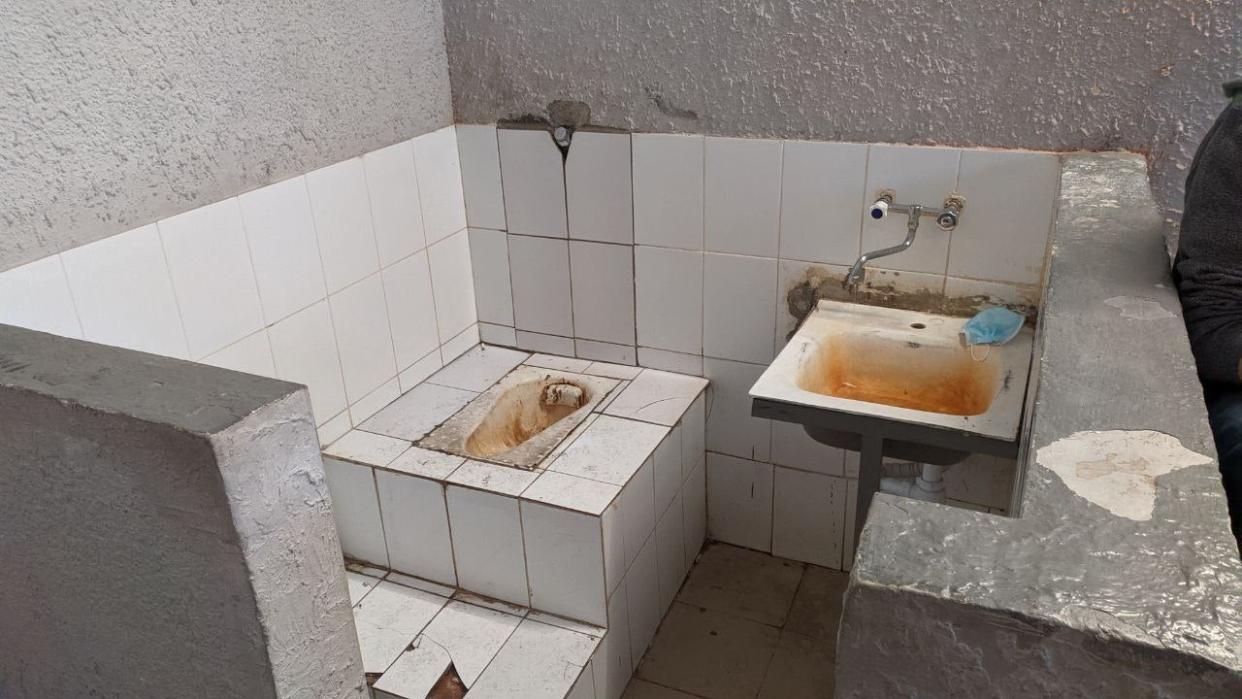28 to a cell, one loo, no beds: Desperate conditions for inmates as Kremlin crackdown overwhelms jails

Inmates say it’s impossible for them to sleep in the ‘appalling’ conditions
(Dmitry Ivanov)Prisoners fill the cell’s bare floors like a carpet of horror. In the corner, a stinking latrine, brought into action at very human intervals. Everywhere else, bodies, trying to sleep without sheets or mattresses, in a space designed for a third of their number.
And they were the lucky ones.
Outside the detention cells, hundreds more were held overnight in unheated police vans, awaiting processing by a prison service working well beyond capacity in the aftermath of Kremlin critic Alexei Navalny’s jailing.
Dmitry Ivanov, 21, a student arrested while protesting at Tuesday night’s pro-Navalny rally, was one of those being held at the Sakharovo jail in southern Moscow, where the worst overcrowding was reported. Speaking via a social media application from the jail, he told The Independent that “appalling” conditions meant sleeping was “impossible” for all but the most lucky.
He had been spooked by the experience, but it would not change his views, he said. He had been motivated to protest not so much because of Navalny – he was not a supporter, though he “respected” him – but the likelihood the Russian president had attempted to assassinate a political opponent, and then jailed him.
“The only thing Putin seems to care about is his own power, and with every year the repression increases,” the student said. “I think my country deserves better.”
Complaints at the Sakharovo centre were generally limited to overcrowding, with many prisoners moved to more appropriate accommodation later on Wednesday. But elsewhere, there were persuasive claims that officers were using violence and torture too.
On Tuesday, Alyona Kitayeva, a volunteer working for one of Mr Navalny’s close associates, told local media she had been tortured into giving passwords to her mobile devices.
“Police officers kicked me and put a bag on my head and held my throat,” she told Dozhd, an opposition-leaning TV station. The activist eventually relented and gave the officers her passwords, but only under serious pressure.
“It was frightening to be alone with four men in a room without any cameras,” she said.
Thousands of Russians have been sent to jail following a series of pro-Navalny protests. The latest, on Tuesday night, was met with a withering response from authorities. Nearly 1,200 were arrested, often violently, in central Moscow alone.
Among the newest detainees was Sergei Smirnov, the editor of MediaZona, an opposition publication specialising in the underbelly of Russia’s repressive regime. He was jailed for 25 days on Wednesday for retweeting a joke that happened to include the timing of a protest action. The presiding judge considered that alone to be a call to participate in an illegal protest.
By Thursday morning at 4.30am local time (1.30am GMT), following hours of being held in a bus, Mr Smirnov was checked into the same cell as Mr Ivanov – designed for eight men, but housing 28.
Ironically enough, most of those arrested were detained under the pretext of violating public health rules during the coronavirus pandemic.
On Thursday, a local NGO condemned the apparent hypocrisy of Russia’s authorities in their approach to pandemic safety. Jail conditions “grossly violated all regulations” and had created the “real risk of mass coronavirus infection,” a statement read.
Holding conditions in a Moscow detention centre. Journalist Sergei Smirnov, jailed yesterday for 25 days, is in the middle, trying to sleep. A reminder that some of those in this cell were jailed on charges of disobeying sanitary tiles during a pandemic. pic.twitter.com/CxkQT84sr2
— Oliver Carroll (@olliecarroll) February 4, 2021
The Public Oversight Commision, an independent prison monitor, meanwhile described the overcrowding in Moscow jails as “unprecedented”.
Speaking with journalists on Thursday, presidential spokesman Dmitry Peskov denied the authorities were instigating a major crackdown. What people were seeing was not “repression” but a “police operation against participants of an unsanctioned rally”, he said.
Mr Peskov also suggested that if there were problems “processing” protest detainees, it was the fault not of authorities but of the protesters themselves.
“Unsanctioned protests create inconveniences for many citizens of the country, including those who turn out to protest,” he said.
Read More
Press in line of fire as Russian authorities tighten grip post-Navalny
Navalny sentenced to nearly three years in prison colony: ‘Punished for surviving Novichok’

